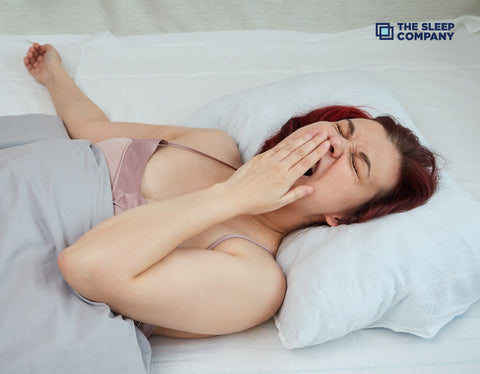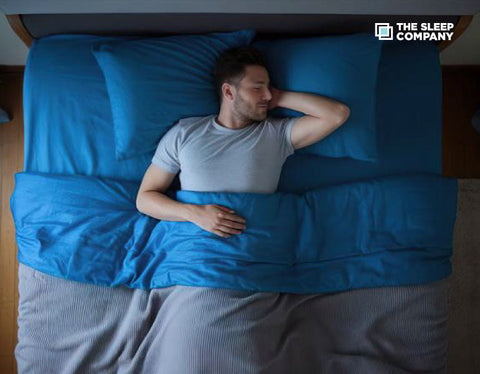My Cart

Sleep Headaches and How to Deal with Them


You’re not the only one whose head is hurting. One of the most prevalent types of discomfort in the world is headaches. Around the world, 75% of adults reported having a headache in the previous 12 months. A significant contributor to absences from school and work is headaches. They also have a negative impact on family and social life. The constant struggle with headaches can make some individuals worried and unhappy.
More than 150 different types of headaches exist. Primary and secondary headaches are the two main classifications. Primary headaches are all those that don’t have a secondary cause. Headaches that are secondary to some other medical condition include those brought on by blood vessel disease of the brain, head trauma, hypertension, infection, medication abuse, sinus congestion, trauma, or tumor.
Nighttime or Sleep headache
If you’ve ever had a headache that woke you in the middle of the night, you might have had a hypnic headache. Given that fewer than 1% of persons are thought to experience hypnic headaches, they are considered to be uncommon. But if you’re one of the individuals who have them, you already know how aggravating they can be.
The term “alarm-clock headaches” refers to an uncommon type of headache called a hypnic headache that awakens a person up while they are sleeping. People may struggle to sleep for fifteen minutes, if not more, due to the agony. Hypnic headache sufferers often encounter them multiple times per week. Only when a person is asleep can they have hypnic headaches. They differ from other forms of headaches like migraines or cluster headaches, which can strike at any time of day and may interfere with sleep.
Headache due to lack of sleep

2011 saw the publication of a study by some researchers that claimed insufficient REM (rapid eye movement) sleep was associated with more severe headaches. The name “REM sleep” refers to the fast eye movements that take place during this stage of sleep, which happens in 90- to 120-minute intervals during the course of the night.
Additionally, during this sleep stage, there is,
- increased bodily movement during dreams
- higher heart rate and
- rapid breathing
REM sleep is thought to be essential for mood regulation, memory consolidation, and learning.
In their 2011 study, the researchers discovered that an inadequate amount of sleep enhances the body’s production of proteins that lead to chronic pain. These proteins seem to lower the body’s pain threshold, which can cause severe migraine headaches.
Headache due to too much sleep
There is no set amount of time you must spend in bed to feel refreshed. Your individual needs for sleep vary depending on a number of variables. According to some research, excessive sleep may impact your brain’s neurotransmitters, notably one (pretty well-known) neurotransmitter called serotonin.
Normally, serotonin aids in maintaining your circadian rhythm, or the regular rhythms of sleep and waking that your body uses to recover and replenish your internal organs. To accomplish this, neurons in your brain transport serotonin to a number of receptors that have been genetically preprogramed for using serotonin for a particular purpose.
In this instance, serotonin instructs these receptors to cause you to wake up or go to sleep. This entire procedure is known as a neural pathway, one of several in your head that assist your body in carrying out specific activities. It can be compared to your brain sending out signals to tell your body when to switch “on” and “off.”
This brain pathway is disrupted when you oversleep. Your body is no longer properly resting if you continue to sleep after serotonin has signalled to your receptors to wake you up. Your body perceives itself as awake and starts to crave food and liquids to reactivate the brain’s sluggishly functioning nerves and blood flow after sleep.
It is therefore possible to experience a headache from moderate nutritional shortage and dehydration if you sleep for several hours after your system has begun to be active. This headache will go away once you consume food or drink.
How to get rid of a sleep headache

Hypnic headaches typically last 90 minutes but can last anywhere from fifteen minutes to three hours. Even though hypnic headaches are uncommon, individuals who do have them, say they happen at least ten times a month. We advise seeking the advice of a specialist or a doctor to cure hypnic headaches.
Treatment options for headaches include:
- Rest in a serene, dark space.
- compresses to your neck or head that are warm or cool
- modest quantities of coffee and massage
- the use of over-the-counter drugs like ibuprofen
How to sleep with a headache
Both insufficient sleep and much sleep can cause headaches. Try to get to bed and wake up every day at roughly the same hour, if at all possible. Use weighted blankets or pillows with specific designs, suitable mattresses, and humidified airflow in the room throughout the winter.
If you’re light sensitive, consider blackout curtains in your bedroom and keep it clear of dust and dirt. Don’t overlook the key component of your bedroom. your priceless mattress! One of the best choices you can make for yourself might be to spend money on a comfortable, luxury mattress. Avoid consuming caffeine, alcohol, and eating too close to bedtime, and turn off gadgets an hour before going to bed.
Develop your ability to relax by exercising frequently, practicing deep breathing, and using biofeedback. A sleep disorder like snoring, sleep apnea, restless legs syndrome, or chronic insomnia may demand the attention of a medical expert or sleep specialist, even though many sleep issues can be resolved by modifying your behaviours.
Compared to the general population, migraine sufferers have a two- to an eight-fold higher risk of having sleep problems. The best course of action is to visit a specialist when nothing appears to be working.
Takeaway
Without putting in a lot of work, headaches and overall health can be addressed. Don’t spend any more nights awake owing to headaches. You may well be able to permanently end your sleep issues if you start improving your sleep patterns tonight.


































































